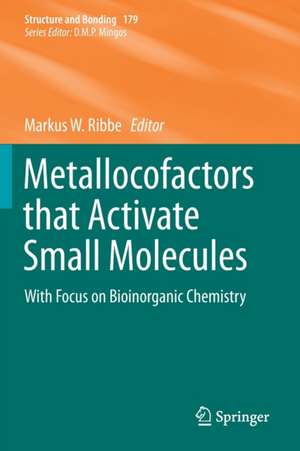Metallocofactors that Activate Small Molecules: With Focus on Bioinorganic Chemistry: Structure and Bonding, cartea 179
Editat de Markus W. Ribbeen Limba Engleză Paperback – 25 sep 2020
Metallocofactors are essential for all forms of life and include a variety of metals, such as iron, molybdenum, vanadium, and nickel. Structurally fascinating metallocofactors featuring these metals are present in many bacteria and mediate remarkable metabolic redox chemistry with small molecule substrates, including N2, CO, H2, and CO2. Current interest in understanding how these metallocofactors function at the atomic level is enormous, especially in the context of sustainably feeding and fueling our planet; if we can understand how these cofactors work, then there is the possibility to design synthetic catalysts that function similarly.
| Toate formatele și edițiile | Preț | Express |
|---|---|---|
| Paperback (1) | 1810.31 lei 6-8 săpt. | |
| Springer International Publishing – 25 sep 2020 | 1810.31 lei 6-8 săpt. | |
| Hardback (1) | 1816.29 lei 6-8 săpt. | |
| Springer International Publishing – 25 sep 2019 | 1816.29 lei 6-8 săpt. |
Din seria Structure and Bonding
- 24%
 Preț: 986.78 lei
Preț: 986.78 lei - 24%
 Preț: 1191.61 lei
Preț: 1191.61 lei -
 Preț: 683.13 lei
Preț: 683.13 lei - 18%
 Preț: 1820.52 lei
Preț: 1820.52 lei -
 Preț: 366.85 lei
Preț: 366.85 lei -
 Preț: 386.81 lei
Preț: 386.81 lei -
 Preț: 381.98 lei
Preț: 381.98 lei - 18%
 Preț: 1806.97 lei
Preț: 1806.97 lei - 18%
 Preț: 1219.01 lei
Preț: 1219.01 lei - 18%
 Preț: 1217.58 lei
Preț: 1217.58 lei - 18%
 Preț: 1215.70 lei
Preț: 1215.70 lei - 18%
 Preț: 1219.01 lei
Preț: 1219.01 lei - 18%
 Preț: 1219.31 lei
Preț: 1219.31 lei - 18%
 Preț: 1824.19 lei
Preț: 1824.19 lei - 18%
 Preț: 1823.39 lei
Preț: 1823.39 lei - 18%
 Preț: 1218.06 lei
Preț: 1218.06 lei - 18%
 Preț: 1821.95 lei
Preț: 1821.95 lei -
 Preț: 381.00 lei
Preț: 381.00 lei - 18%
 Preț: 1228.62 lei
Preț: 1228.62 lei - 18%
 Preț: 1218.21 lei
Preț: 1218.21 lei - 18%
 Preț: 1212.68 lei
Preț: 1212.68 lei - 18%
 Preț: 1820.08 lei
Preț: 1820.08 lei - 18%
 Preț: 1827.32 lei
Preț: 1827.32 lei - 18%
 Preț: 2090.92 lei
Preț: 2090.92 lei - 18%
 Preț: 1217.10 lei
Preț: 1217.10 lei - 18%
 Preț: 1821.81 lei
Preț: 1821.81 lei - 18%
 Preț: 1216.48 lei
Preț: 1216.48 lei - 18%
 Preț: 1820.22 lei
Preț: 1820.22 lei - 15%
 Preț: 640.24 lei
Preț: 640.24 lei - 18%
 Preț: 1811.86 lei
Preț: 1811.86 lei
Preț: 1810.31 lei
Preț vechi: 2207.69 lei
-18% Nou
Puncte Express: 2715
Preț estimativ în valută:
346.45€ • 360.36$ • 286.01£
346.45€ • 360.36$ • 286.01£
Carte tipărită la comandă
Livrare economică 15-29 aprilie
Preluare comenzi: 021 569.72.76
Specificații
ISBN-13: 9783030258993
ISBN-10: 3030258998
Pagini: 169
Ilustrații: VII, 169 p. 70 illus., 61 illus. in color.
Dimensiuni: 155 x 235 mm
Greutate: 0.26 kg
Ediția:1st ed. 2019
Editura: Springer International Publishing
Colecția Springer
Seria Structure and Bonding
Locul publicării:Cham, Switzerland
ISBN-10: 3030258998
Pagini: 169
Ilustrații: VII, 169 p. 70 illus., 61 illus. in color.
Dimensiuni: 155 x 235 mm
Greutate: 0.26 kg
Ediția:1st ed. 2019
Editura: Springer International Publishing
Colecția Springer
Seria Structure and Bonding
Locul publicării:Cham, Switzerland
Cuprins
Chapter 1. Looking at Nitrogenase: Insights from Modern Structural Approaches.- Chapter 2. Current Understanding of the Biosynthesis of the Unique Nitrogenase Cofactor Core.- Chapter 3. Recent Advances in the Chemical Synthesis of Nitrogenase Model Clusters.- Chapter 4. The Catalytic Mechanisms of the Molybdenum and Tungsten Enzymes.- Chapter 5. The Role of the Pyranopterin Dithiolene Component of Moco in Molybdoenzyme Catalysis.- Chapter 6. Mechanism of Ni,Fe-Containing Carbon Monoxide Dehydrogenases.
Notă biografică
The focus of Dr. Ribbe’s research is the assembly and mechanism of nitrogenase, one of the most complex metalloenzymes known to date. Nitrogenase can be appreciated from the perspective of the useful agricultural and industrial products it generates, namely, ammonia, hydrogen and hydrocarbons. Since the beginning of his independent career, Dr. Ribbe has focused his efforts on investigating the biosynthesis of the Mo-nitrogenase from Azotobacter vinelandii and, in particular, the unique metal centers of its MoFe protein component: FeMoco and P-cluster. Results of these studies have firmly established nitrogenase MoFe protein as a model system that could be used to deduce the general mechanism of metal cluster assembly and develop successful strategies for synthesizing bio-inspired catalysts for industrial usage. Recently, Dr. Ribbe expanded his research to the investigation of the structure and function of the “alternative” V-nitrogenase from Azotobacter vinelandii. His discovery that V-nitrogenase can convert CO to hydrocarbons provides a potential blueprint for developing cost-efficient processes for industrial production of biofuels in the future.
Textul de pe ultima copertă
This volume highlights recent progress on the fundamental chemistry and mechanistic understanding of metallocofactors, with an emphasis on the major development in these areas from the perspective of bioinorganic chemistry.
Metallocofactors are essential for all forms of life and include a variety of metals, such as iron, molybdenum, vanadium, and nickel. Structurally fascinating metallocofactors featuring these metals are present in many bacteria and mediate remarkable metabolic redox chemistry with small molecule substrates, including N2, CO, H2, and CO2. Current interest in understanding how these metallocofactors function at the atomic level is enormous, especially in the context of sustainably feeding and fueling our planet; if we can understand how these cofactors work, then there is the possibility to design synthetic catalysts that function similarly.
Caracteristici
Presents an overview of the fundamental chemistry of metallocofactors within the field of bioinorganic chemistry Provides a review of the mechanistic understanding of metallocofactors Multi-authored volume with contributions from world renowned experts in the field
